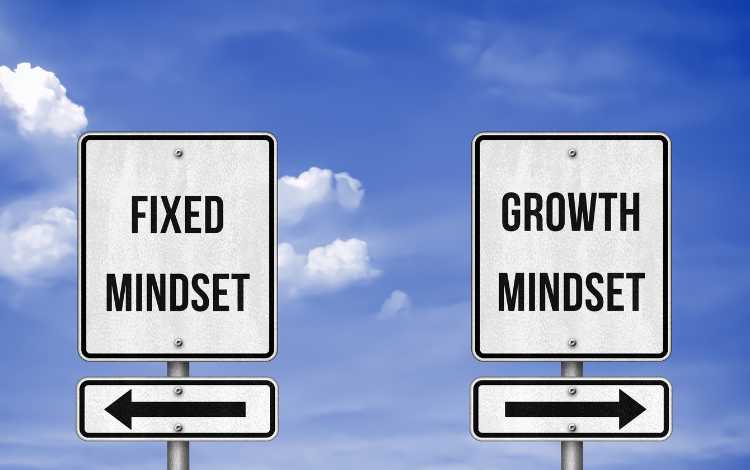
Unlocking Your Potential Through the Power of Positive Thinking and Resilience
This article looks into the transformative impact of a growth mindset on both personal and professional realms. It highlights the importance of positive thinking, continual learning, and resilience, offering insights and strategies to foster a mindset conducive to success and fulfillment.
In a constantly changing and increasingly competitive world, the ability to adapt and grow has never been more important.
Browse our online courses on meditation, positive thinking, overcoming procrastination, and freedom from distractions.
The concept of a growth mindset, introduced by psychologist Carol Dweck, has revolutionized our understanding of success. Unlike a fixed mindset, which assumes that our capabilities are static, a growth mindset thrives on challenge and sees failure not as evidence of unintelligence but as a heartening springboard for growth and for stretching our existing abilities.
This article explores the profound influence of adopting a growth mindset on personal and professional achievements. We’ll discuss how positive thinking, a willingness to confront challenges, and resilience are cornerstones in this transformative journey.
Understanding the Growth Mindset
The concept of a growth mindset is rooted in the belief that our basic abilities can be developed through dedication and hard work. This perspective fundamentally changes how we face challenges and setbacks, turning them into opportunities for improvement rather than signs of failure.
Fixed vs. Growth Mindset
At the heart of the growth mindset is a contrast with its counterpart: the fixed mindset.
People with fixed mindsets believe their abilities, intelligence, and talents are fixed traits. They often avoid challenges, fearing failure, and believe effort is fruitless if one lacks inherent ability.
On the other hand, those with a growth mindset understand that effort is a path to mastery. They embrace challenges, persist in the face of setbacks, see effort as essential, and learn from criticism.
The Brain’s Ability to Grow
Neuroscientific research supports the concept of a growth mindset by showing that the brain is like a muscle that gets stronger and more efficient with use. Neuroplasticity, the brain’s ability to form and reorganize synaptic connections, particularly in response to learning or experience, is key here.
When we learn new things or challenge ourselves, our brain forms new connections, enhancing our ability to learn and adapt.
The Impact of Positive Thinking and Resilience
Positive thinking and resilience are fundamental elements in cultivating a growth mindset. They enable us to navigate through challenges and setbacks with a perspective that fosters learning and growth.
h3>Power of Positive Thinking
Positive thinking doesn’t mean ignoring life’s stressors or difficulties. Instead, it means approaching these challenges in a more optimistic and productive way.
People with a growth mindset believe that effort will lead to improvement and view obstacles as opportunities to learn and grow. This outlook helps in maintaining motivation and persistence in the face of difficulties.
Resilience: Bouncing Back from Setbacks
Resilience, the ability to recover from setbacks, adapt well to change, and keep going in the face of adversity, is crucial in a growth mindset.
It’s not about avoiding failure but learning how to deal with it effectively. Embracing failure as a part of the growth process helps in developing resilience.
Resilient individuals use failures as feedback, learning what didn’t work and adjusting their strategies accordingly.
Embracing Failure as a Learning Opportunity
Successful people often have a history of failures but differ in how they respond to them. Instead of viewing failure as a reflection of their abilities, they see it as a necessary step in the learning process. This approach fosters continuous improvement and resilience, essential for achieving long-term goals and success.
Growth Mindset in Professional Development
Incorporating a growth mindset in the professional sphere can significantly enhance career development and success. This mindset encourages continuous learning, adaptability, and effective handling of challenges and setbacks.
Innovation and Adaptability
A growth mindset fosters a culture of innovation and adaptability in the workplace. Employees who believe in their ability to develop their skills are more likely to embrace new technologies, experiment with new ideas, and adapt to changing circumstances.
This attitude is crucial in today’s fast-paced business environment, where flexibility and innovation are key drivers of success.
Continual Learning and Skill Development
Professionals with a growth mindset understand the importance of continual learning and skill development. They are more likely to seek out training opportunities, take on challenging projects, and learn from their experiences.
This commitment to personal and professional growth not only enhances their capabilities but also makes them more valuable and versatile employees.
Dealing with Professional Setbacks
A growth mindset also changes how professionals deal with setbacks and challenges.
Viewing these experiences as learning opportunities rather than failures encourages a more constructive response. It leads to better problem-solving, increased resilience, and a proactive approach to overcoming obstacles.
Role of Tools like Paystubs Generators
In a practical sense, tools like free paystubs generators can be a part of this growth journey. They provide a tangible way to track financial progress and career development, serving as a reminder of how far one has come and where one needs to go.
Such tools can aid in setting realistic career goals and financial planning, which are integral parts of professional growth.
Cultivating a Growth Mindset in Personal Life
Cultivating a growth mindset extends beyond professional development; it’s equally crucial in our personal lives. By applying the principles of a growth mindset to our daily routines, relationships, and personal goals, we can enhance our overall quality of life.
Setting Achievable Goals
One of the first steps in cultivating a growth mindset personality is to set achievable and realistic goals.
These goals should be challenging yet attainable, pushing us out of our comfort zones while ensuring they’re not so daunting as to be discouraging.
Breaking larger goals into smaller, manageable tasks can help maintain motivation and a sense of progress.
Practicing Gratitude and Mindfulness
Practicing gratitude and mindfulness is another key aspect. Being mindful and appreciative of the present moment can shift our focus away from negative thoughts and towards a more positive outlook.
This perspective encourages us to see challenges as opportunities for growth and learning rather than as insurmountable obstacles.
Engaging in Reflective Practices
Reflective practices such as journaling or meditation can aid in developing a growth mindset. They allow for self-reflection, helping us understand our thought patterns, behaviors, and reactions to various situations.
This self-awareness is crucial for recognizing when we might be slipping into a fixed mindset and need to reorient toward growth.
Understanding Intrinsic Motivation
Understanding what intrinsically motivates us is vital. A growth mindset is fueled by internal motivations such as personal satisfaction, curiosity, and the desire to learn rather than external rewards.
Identifying and pursuing activities that align with these intrinsic motivators can lead to more sustainable and fulfilling growth.
Utilizing Tools like Paystubs Generators
Everyday tools like paystubs generators can also play a role in personal development. They can be used to monitor financial health, which is often a reflection of personal growth and decision-making.
Regularly reviewing and managing personal finances with these tools can encourage a disciplined, goal-oriented approach in other areas of life.
Conclusion
The journey to cultivating a growth mindset is both challenging and rewarding. Embracing the principles of positive thinking, resilience, and continual learning enables individuals to unlock their true potential, leading to greater personal and professional success.
By understanding and applying the concepts of a growth mindset, we can transform the way we approach challenges, setbacks, and opportunities in all aspects of our lives.
Whether it’s through setting realistic goals, practicing mindfulness, or utilizing practical tools like paystubs generators for financial tracking, the path to a growth mindset is a continuous one.
Each step taken on this journey is a step towards a more fulfilled and successful life. Remember, the true power of a growth mindset lies in its application across all realms of our existence, paving the way for a lifetime of learning, growth, and achievement.
About the Author
Samantha Clark is a Warrington College of Business graduate. She works for the professional accounting firm, ThePayStubs. She handles all client relations with top-tier partners and found her passion in writing articles on various finance and business-related topics.

